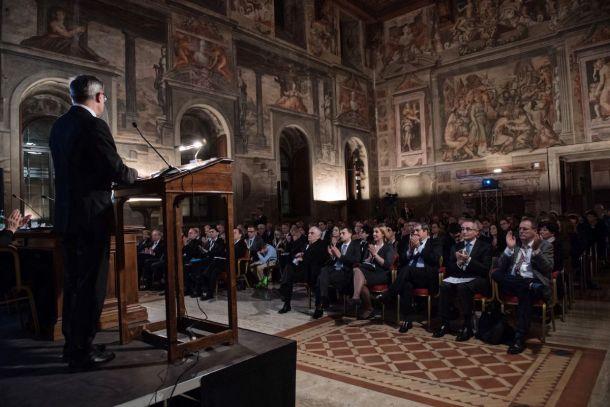ROME, 17 February 2017 – The International Holocaust Remembrance Alliance (IHRA) conference in cooperation with the Holy See “Refugee Policies from 1933 until Today: Challenges and Responsibilities” concluded this evening at the Palazzo della Cancelleria in Rome.
The conference brought together international experts to explore the topic of refugee policies, and their impact, from the 1930s to the present day.
The preliminary outcomes and suggestions – for policy-makers, international organizations and civil society – which emerged from the conference, and were grounded in the history of the Holocaust, included; collecting war crimes evidence from refugees, enhancing cooperation between NGOs and the state, reaffirming respect for the value of international law, its implementation, and human rights. The perspective of refugees, and the impact of statelessness and powerlessness on displaced persons were also highlighted.
Dr. Susanne Heim, Institute of Contemporary History Munich, analyzed refugee policies in the pre-war period noting the lack of coordinated action between states and the dissipation of compassion in societies over time.
“The reaction of states lacked any sort of solidarity, was short-sighted and tended towards nationalism,” said Dr Heim.
“Failure to solve the refugee crisis damaged the democratic substance of European nations and the United States leading to the militarization of borders which forced refugees to take dangerous routes and the triggered the establishment of camps which later acted as detention centres.”

In his paper Prof. Dan Plesch, SOAS, University of London, stressed the importance of self-management for refugees as a way to empower and enable displaced persons to actively contribute to their future – an idea which was later built on by Mr Mukesh Kapila, CBE, Refugee Crisis Group, University of Manchester. “That refugees should elect and run their own camps may seem like a radical idea today, but it was the foundation on which the UNRRA camps operated,” Prof. Plesch said.
Prof. Plesch also showed documents from the UN War Crimes Commission outlining the crimes of the Holocaust filed as early at 1944 and urged the collection of evidence from refugees.
The important role of the Holocaust experience in the foundation of legal human rights protection and the need for a common approach to the current refugee situation recurred throughout the conference: “It is an illusion to think that individual member states can handle migration through national action. There is a need to harmonize migration and asylum regulation,” Said Mr Stefan Lehne, Carnegie Foundation.
Ms. Kristina Touzenis, Head of the International Migration Law Unit, International Organization for Migration, built on the idea of the responsibility of states saying “in simple words, you need to ask yourself “Would you like to be treated the way refugees are being treated. If the answer is no, something is wrong in the implementation of the legal protections. There is a need to move towards better implementation of existing tools – the framework is already there.”
The conference was closed by Mr. Stephane Jaquemet, Regional Representative for Southern Europe at UNHCR and Prof. Michael O’Flaherty, Director of the European Agency for Fundamental Rights.
Mr Jaquemet began by stressing that to understand today and tomorrow’s challenges, it was not only important to have a historical perspective but also to remember because “through remembering we can build an antidote against hate.” He also made clear that “indifference kills” as it was in the face of indifference that criminal acts could flourish.
“The Holocaust was characterized by the failure to protect. I am glad that this conference has put us on the path of solidarity which is fundamental in responding to the refugee situation” Mr Jaquemet said.
Prof. Michael O’Flaherty commended the idea of learning from the past to inform the future, encouraging policy-makers to reflect on the events of history and also to learn from countries who have a great deal of expertise in responding to and integrating refugees. He, too, stressed the value of the Human Rights system: “We did not build up the framework of international law after the Second World War to simply ignore it now when we are facing a humanitarian crisis of this scale. Let us shame those who commit illegalities and immoralities and prosecute hate speech and hate crime.”
Prof. O’Flaherty ended the conference on a hopeful note, stressing that he was impressed by the “remarkable good practices, the fundamental goodwill and the astonishing achievement that is the Human Rights system.”
In closing Prof. O’Flaherty said “I believe that the Human Rights system we have constructed is resilient and will provide the answers we need.”
Over the next months the International Holocaust Remembrance Alliance will further discuss the outcomes and suggestions from the conference and will produce a supporting conference report. A publication of the conference papers is planned for 2017.
More information about the event, with photos on the conference page at IHRA’s website.
